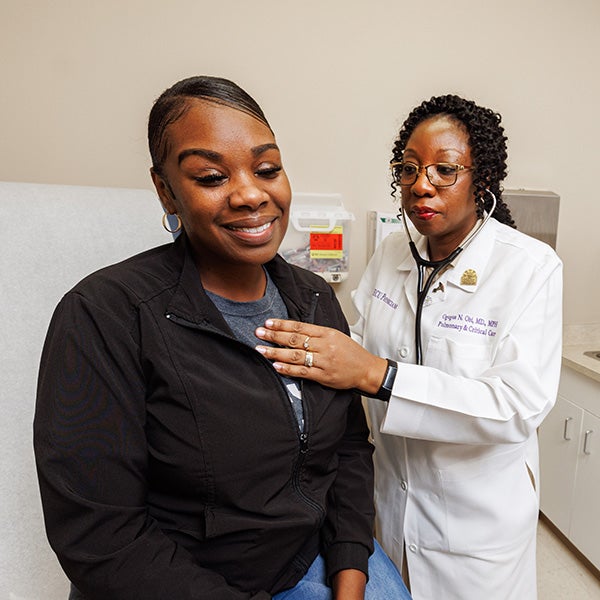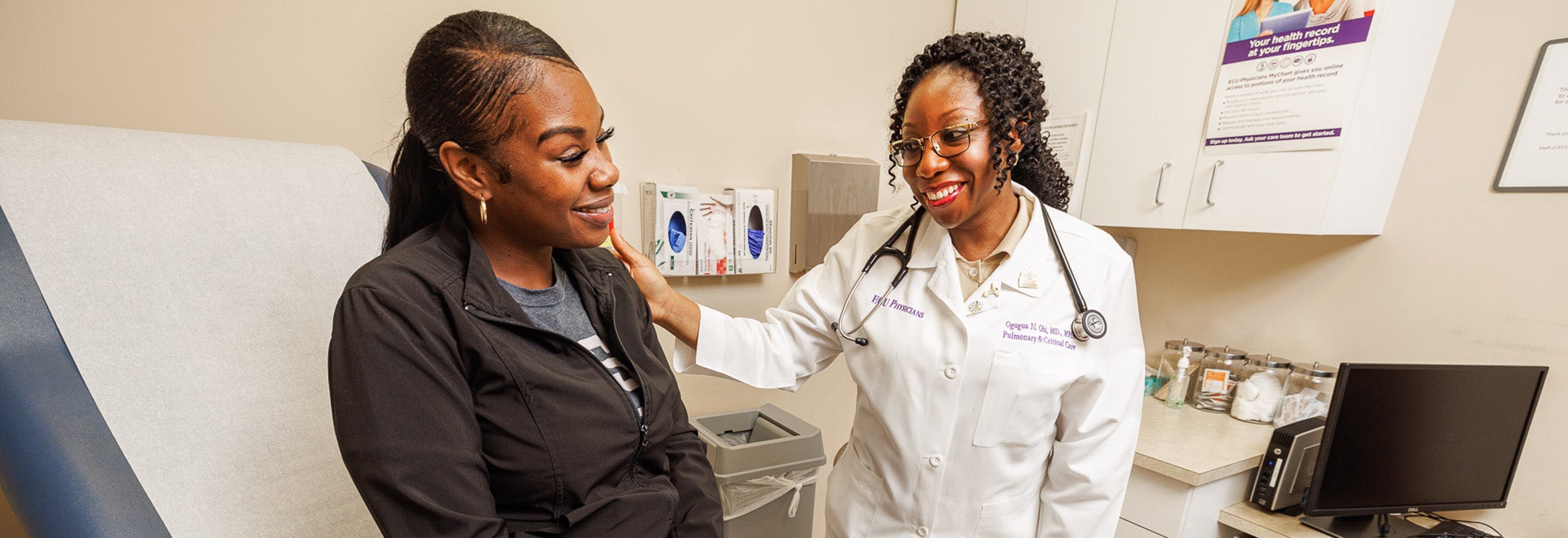TREATING SARCOIDOSIS
ECU clinic a ‘Global Center of Excellence’ in treatment of inflammatory disease
An East Carolina University clinic is gaining international recognition for its efforts to tackle a bedeviling systemic inflammatory disease that affects an unusually high number of people in eastern North Carolina.
Sarcoidosis is an inflammatory disease that causes granulomas, or clumps of immune cells, to develop in any organ in the body, though the lungs, skin and eyes are mostly commonly affected. The cause of sarcoidosis is unknown but there are indications that external conditions like allergens, bacteria, viruses and other exposures may trigger disease in genetically predisposed individuals.
Less than 200,000 people in the U.S. have sarcoidosis, making it relatively rare. But there is an abnormally high incidence and prevalence of sarcoidosis in eastern North Carolina.
“The disease predominantly affects African American women and tends to be more severe in patients of lower socioeconomic status,” said Dr. Ogugua Ndili Obi, a pulmonary and critical care physician and assistant professor at ECU’s Brody School of Medicine, who serves as the director of the Sarcoidosis Center at ECU.
Sarcoidosis is not usually fatal, with a mortality rate of about five percent, but North Carolina is in the top five states where patients die of the disease.

Less than 200,000 people in the U.S. have sarcoidosis, making it relatively rare, but there is an abnormally high incidence and prevalence of sarcoidosis in eastern North Carolina.
Recent work by a group of ECU researchers revealed that sarcoidosis mortality in eastern North Carolina is well above national statistics and that eastern North Carolina has the highest death rates of those diagnosed in the state. Black North Carolinians have five times the mortality rate than the general population of sarcoidosis patients, and Black women in the region are 12-13 times more likely to die as a result of the disease than their white counterparts.
“We do think that it has to do with a gene-environment interaction,” Obi said. “So, patients who have some genetic predispositions are exposed to certain things in the environment: rural-living exposures, farming, animal breeding, metalworking and smoke exposures.”
The establishment of the Sarcoidosis Center at ECU was significant for the mostly rural, 29-county region of eastern North Carolina it serves, as the need has been much greater than originally anticipated.
Obi initially estimated that a three-month timeframe would result in 50-60 patient visits. However, a recent review of patient charts showed that it takes less than a month for the center to welcome that many patients.
“Unfortunately, sarcoidosis seems to be a disease where you do have an intersection of race and socioeconomic status, what I call the double-whammy,” Obi said. “But when you also add on that it affects African American females more, that is the triple whammy — race, gender and socioeconomic status.”
Obi said the center’s patients receive the best quality of care possible from a dedicated team of health care providers, collaborators and clinic staff.
International experts in the field agree.
In November 2020, the executive committee of the World Association of Sarcoidosis and Other Granulomatous Disorders (WASOG) named the Sarcoidosis Center at ECU as one of 45 global centers of excellence. A sarcoidosis clinic achieves Center of Excellence status by having a multi-disciplinary team of medical experts that focuses on research of the diseases, leadership in the specialty and quality care for sarcoidosis patients.
Dr. Marc Judson, a sarcoidosis specialist and the chief of the pulmonary and critical care division of Albany Med Health System in Albany, N.Y., called the ECU clinic a beacon of hope for the region.
“The Sarcoidosis Center at ECU is a godsend to coastal North Carolina communities and in particular to African Americans living there,” Judson said. “There is no doubt in my mind that the clinic is making a difference to sarcoidosis patients there, including saving lives.”
Obi credits Dr. Yash Kataria, a Brody School of Medicine professor emeritus, for doing the initial groundwork to establish ECU’s sarcoidosis clinic.
“He predated me, and he did a lot of work, published a lot of papers, and put a lot of what currently exists in terms of what we know about sarcoidosis in place,” Obi said.
Dr. Mark Bowling, a pulmonologist and associate professor at Brody, also credits Kataria with establishing a focus on sarcoidosis in eastern North Carolina in the 1980s.
“Eastern North Carolina was very much a medical frontier at that time. Dr. Kataria established pulmonary medicine in the region and recognized the uncanny occurrence of sarcoidosis,” Bowling said. “Dr. Obi took the reins from Dr. Kataria and not only continued the clinic, but has taken it to new heights: adding regional and national recognition, establishing clinical trials and growing the number of patients exponentially.”
In addition to providing world-class care to sarcoidosis patients, the Sarcoidosis Center at ECU is also involved in research — including several funded and non-funded trials — to help broaden the scope of knowledge and treatments available for the disease.
“Sarcoidosis is a rare disease, and we need to learn more about the disease and its effects,” Obi said. “Clinical and pre-clinical research provides this opportunity. There is also a need to provide better treatment for the disease, and participation in drug trials is the avenue for this to happen.”
For more information, visit the center’s website or call 252-744-2570.
